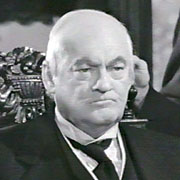by Liz Gunnison Dec 23 2008
Miserly old Mr. Potter was right: It’s a Wonderful Life hero George Bailey never should’ve given those loans to the likes of Ernie and Bert.
Over the years, Frank Capra’s It’s a Wonderful Life has become a Christmas classic—a heartwarming, eye-watering parable about virtue being its own reward.
The story of George Bailey, the big-hearted proprietor of Bailey Savings & Loan, is morally uncomplicated. Bailey is a generous lender and lenient collector; his rival, a miserly, hard-hearted millionaire banker named Henry Potter is an unrepentant villain who derides Bailey for his lack of business acumen and lax lending standards.
Script excerpt from Internet Movie Script Database.
But knowing what we know now, about the dangers of subprime mortgages and the virtues of disciplined bankers, perhaps it’s time to reconsider the financial—if not the sentimental—lesson of It’s a Wonderful Life. In short: Was George Bailey a reckless subprime lender? Was Henry Potter a sober, misunderstood businessman?
The difference between the two men is captured in one particularly memorable scene, in which civic leaders of the small town in which the movie is set discuss the recent death of George Bailey’s saintly father, Peter. He’d founded the savings and loan, and was as generous as his son.
POTTER
Peter Bailey was not a businessman. That’s what killed him. Oh, I don’t mean any disrespect to him, God rest his soul. He was a man of high ideals, so-called, but ideals without common sense can ruin this town. (Picking up papers from table.) Now, you take this loan here to Ernie Bishop…You know, that fellow that sits around all day on his brains in his taxi. You know…I happen to know the bank turned down this loan, but he comes here and we’re building him a house worth five thousand dollars. Why?
GEORGE
Well, I handled that, Mr. Potter. You have all the papers there. His salary, insurance. I can personally vouch for his character.
POTTER
(Sarcastically) A friend of yours?
GEORGE
Yes, sir.
POTTER
You see, if you shoot pool with some employee here, you can come and borrow money. What does that get us? A discontented, lazy rabble instead of a thrifty working class. And all because a few starry-eyed dreamers like Peter Bailey stir them up and fill their heads with a lot of impossible ideas. Now, I say…
Our typical reaction: “Boo, Mr. Potter! Yay, George Bailey! You give that loan to good ol’ Ernie Bishop, on the basis of his character.”
And yet, this time around, the whole exchange is strangely…tainted. As we spend this holiday season in the jaws of a subprime meltdown, the heretofore-Manichean parable seems a little bit less black and white.
We’re not saying that Bailey versus Potter is a perfect allegory for today’s credit crunch; Angelo Mozilo and his predatory buddies are no latter-day George Baileys, “starry-eyed dreamers” giving up their own riches to give the Ernie Bishops of the world a chance at the American Dream.
And the majority of the bad loans that have crippled our credit markets were not made to folks like Ernie Bishop, working tirelessly to put a roof over their families’ heads. A fair few of those loans enabled bad real estate investments by people who had no business buying or building homes as big as they did.
But consider this: Perhaps Mr. Potter wasn’t just a heartless Scrooge. Perhaps Mr. Potter, in the absence of sufficient regulatory oversight, was the one voice of sanity keeping the good people of Bedford Falls from over-leveraging themselves.
Perhaps, if we had all taken Mr. Potter a little bit more seriously, we wouldn’t be in this mess to begin with.
Script excerpt from Internet Movie Script Database.

Terry,
You truly are a Mr. Potter and a Grinch.
The big difference of Bailey to the sub-prime lenders: Bailey didn’t enrich himself. He didn’t pay himself an outrageous salary or bonus.
The real lesson therefore is: Greed is bad. And George Bailey shows that nicely.